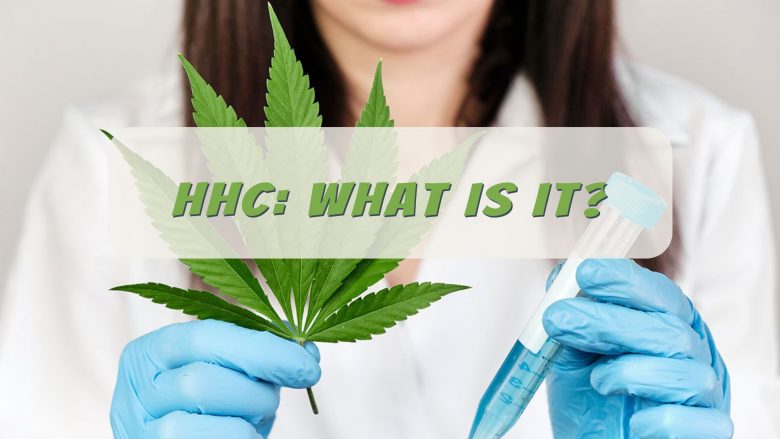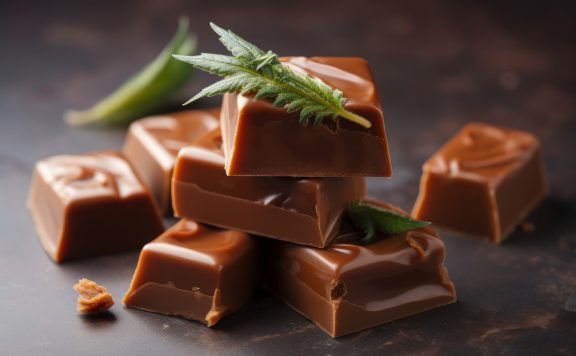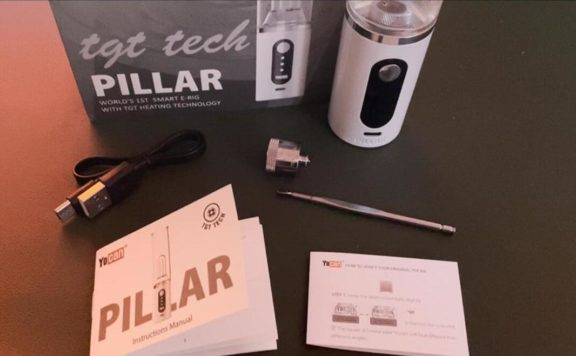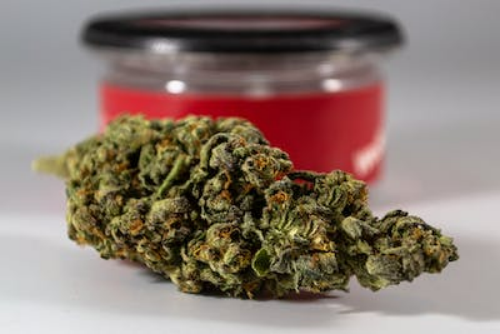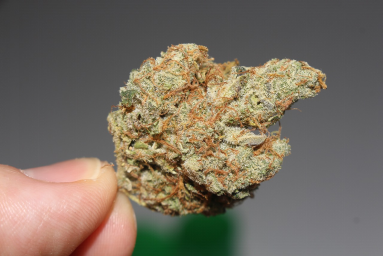Manufacturers appear to have been competing to develop new forms of cannabinoids to expand the market over the past two years. Currently, HHC is one of the most popular cannabinoids.
It’s a THC analog, like delta 8 THC, although anecdotal evidence suggests that drug tests don’t detect it. Don’t consider this as guidance from me because it hasn’t been validated.
Because of its outstanding ability to resist oxidation, UV radiation, and heat, HHC is particularly stable, making it easier to store than cannabis buds. This guide will take you through the basics of this substance.
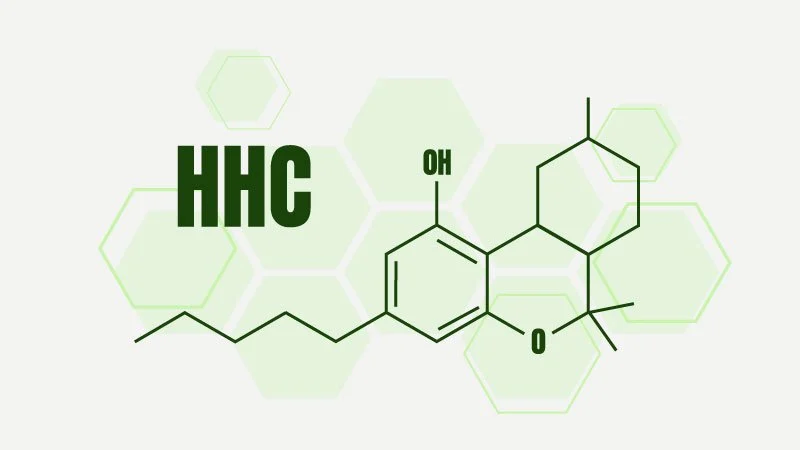
Hexahydrocannabinol, more often abbreviated as HHC, is a hydrogenated version of THC.
This substance is created through hydrogenation, a method that involves injecting hydrogen atoms into the chemical structure to stabilize it. This method is also used by margarine makers to harden vegetable oils.
Only tiny levels of HHC are naturally present in hemp. A rigorous procedure is carried out to incorporate hydrogen atoms into THC, utilizing a catalyst such as palladium or nickel as well as high pressure to obtain a useful quantity.
This results in the destruction of the double-bond chemical structure of THC and its replacement with hydrogen while maintaining the effectiveness and properties of the cannabinoid. To present, scientists have identified at least ten different isomers of such a hydrogenated THC.
This small change improves THC’s propensity for binding to TRP pain receptors as well as CB1 and CB2 cannabinoid receptors.
What’s more intriguing is that THC’s molecular structure is strengthened by hydrogenation, making it less prone to oxidation and destruction than its base cannabinoid.
THC loses hydrogen atoms during oxidation, resulting in the formation of two new double bonds. CBN (cannabinol), which is produced as a result, only possesses around 10% of the psychotropic potency of THC.
When subjected to environmental elements including air, heat, and light, HHC retains its potency for a longer period than THC does.
As a result, if you are a post-apocalyptic survivalist, you might keep a portion of the HHC to help you get through tough times.
How Do HHC and THC Compare?
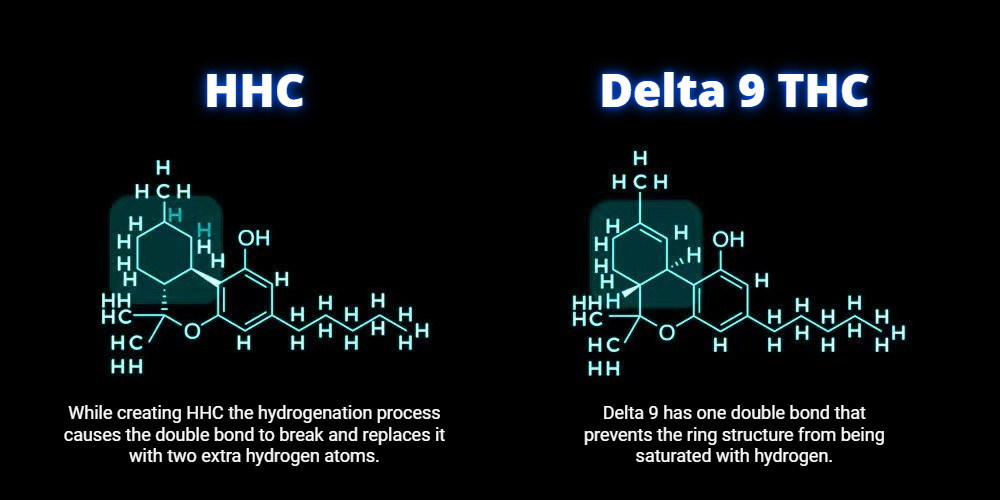
HHC’s effect profile is extremely similar to that of THC’s psychoactive effects. It will make you feel euphoric, change how you perceive sight and sound, enhance your hunger, and momentarily raise your heartbeat.
According to some HHC enthusiasts, its effects are in between those of delta 8 and delta 9 THC, and they are more calming than energizing.
Since the relatively new substance shares many of THC’s medicinal and health advantages due to its molecular structure, there isn’t much research that has looked into its potential as a drug.
More research is needed to fully assess the cannabinoid’s range of health advantages, although research on beta-HHC in mice showed the compound to have significant painkilling effects.
Is It Legal?
The legality of HHC is ambiguous, much like other THC analogs like delta 8. Some businesses assert that these goods are lawful because hemp naturally contains HHC. However, some legal experts contend that because the substance does not occur naturally in significant quantities, other substances are added during the production process.
The Drug Enforcement Administration (DEA) issued a statement outlining its position on how cannabis and its constituent parts will be regulated under the 2018 Farm Bill. “All synthetically produced tetrahydrocannabinol remain Schedule I restricted substances,” the agency announced.
Therefore, whether HHC is a natural or manufactured substance is at the heart of the main argument concerning its legality.
If federal authorities classify the substance as natural, it is acceptable as long as it derives from hemp and has a delta 9 THC content of less than 0.3%. If they determine it to be synthetic, it will nevertheless be legally recognized as such by the federal authorities until cannabis is decriminalized or made lawful on a national scale.
In conclusion, it is impossible to determine whether HHC is entirely legal or illegal unless a court renders a decision on the matter.
Utilize this product, then, at your own risk.
What Negative Effects Does HHC Have?
Just like other recently found cannabinoids, study on the safety and health risks of HHC is scarce; the majority of the knowledge about its safety profile originates from conjecture.
As of now, entry research indicates that the substance has a safety and risk profile like that of THC, with consumers who used large doses of THC reporting similar unpleasant responses.
If you consume too much HHC, you could encounter:
- Red eyes
- Increased heartbeat
- Paranoia
- Insomnia
- Higher appetite
- Dry mouth
- Dizziness
- Anxiety
What HHC Dosage Will Produce the Best Outcome?
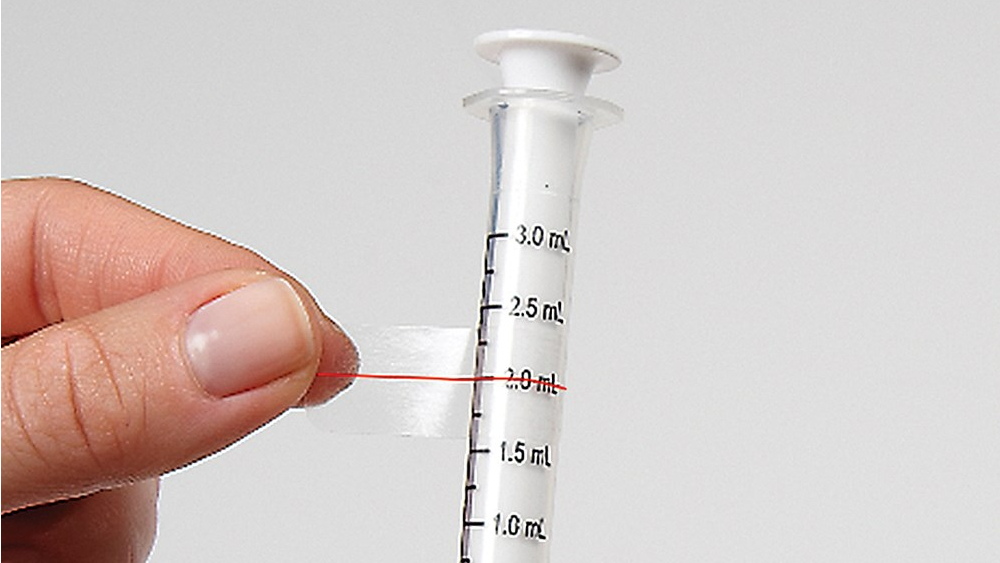
Some variables, including gender, metabolism, weight, age, and tolerance levels, affect the ideal amount of any psychoactive chemical.
You may not be aware of your tolerance level if you’ve never taken HHC, while there’s a general rule: you should place this cannabinoid somewhere in between the calming effects of delta 8 THC and the highly psychoactive effects of delta 9 THC.
The best method for determining the quantity that is appropriate for your case is to begin low and progressively raise the dosage until your body exhibits the correct response.
Delta 8 THC dosage example:
- Low dosage: 10 – 20 mg for each serving
- Medium dosage: 20 – 50 mg for each serving
- High dosage: 50 – 100 mg for every serving
If it’s your first time smoking or vaping high-THC cannabis (marijuana), add 5 mg to the high-and-low ends of the delta 8 doses.
But if you’ve already used one or the other frequently, starting with the same or slightly larger dosage of HHC might be wise. Once more, figuring out your ideal dosage heavily depends on understanding your threshold.
Before conclusion, microdoses can begin with a rather modest dose—as little as 1-2 mg—to ensure the possibility of feeling euphoric effects while obtaining a steady cognitive boost.
Reaction During Drug Tests
HHC consumers won’t fail a typical 12-panel drug test since it won’t be able to recognize it, which is one of the main selling points advertised by dealers in addition to the product’s lengthy shelf life.
Because other THC aptamers, such as delta-8, can be detected in substantial quantities by blood or urine tests, this may sound appealing to many people.
Anecdotal data is the main source of the rumors that HHC isn’t detected on a drug test. According to preliminary studies, it does not in fact undergo liver conversion to 11-hydroxy-THC, the principal THC byproduct that might provide a false-positive result.
You should be warned that since this hasn’t been extensively tested, there’s still a chance you could fail your drug test if you take it.
Conclusion
Although much remains unknown about HHC, the following is a concise review of what is known:
- Hemp carries the chemical HHC, not in large amounts though.
- With the help of high pressure and a catalyzer, THC must be converted before it can be extracted from hemp.
- It’s a hydrogenated version of THC.
- Compared to THC, it’s a highly stable chemical structure and is more air-, light-, and heat-resistant.
- Compared to THC, the shelf life of HHC is far longer.
- Its legal status is murky due to the complex procedures required for its chemical extraction.
- Typically, a THC drug test might not pick up HHC, but this information is largely anecdotal.
Every new cannabinoid that reaches the market has its own special advantages, but it’s always a good thing to stay cautious if you choose to use HHC or any other unproven substance.

